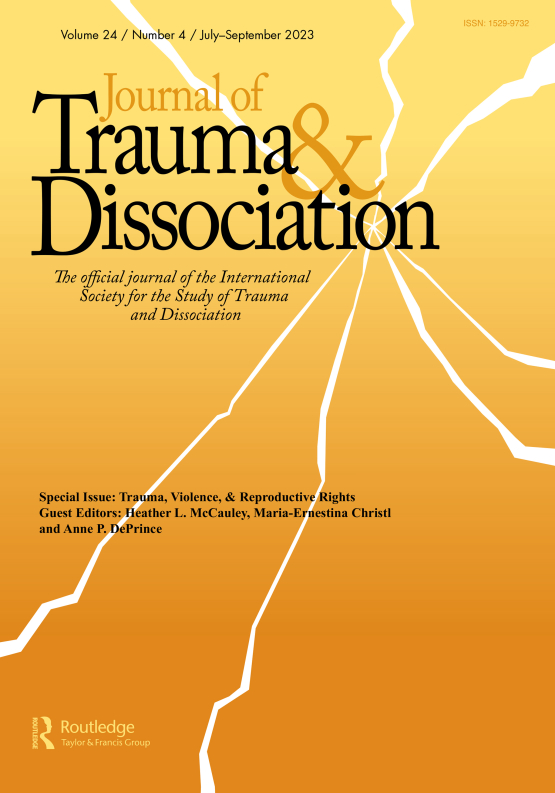Submit a Manuscript to the Journal
Journal of Trauma & Dissociation
For a Special Issue on
Understanding, Preventing, & Healing Dissociation in the Context of Intersectional Inequalities
Manuscript deadline
15 October 2024

Special Issue Editor(s)
Jennifer M. Gómez, Ph.D,
Boston University
[email protected]
Robyn L. Gobin, Ph.D,
University of Illinois at Urbana-Champaign
[email protected]
Anne DePrince, Ph.D.,
University of Denver
[email protected]
Understanding, Preventing, & Healing Dissociation in the Context of Intersectional Inequalities
Dissociation fundamentally connotes a fragmentation of the self and can manifest cognitively, psychologically, and/or somatically. Individuals and communities who are oppressed or marginalized may experience dissociative fragmentation and disconnection from their personal and social identity (e.g., gender, race, self-integrity, etc.) and communities (alienation, abandonment, betrayal) due to intersectional inequalities (e.g., sexism, racism, and homophobia).
In his book, the Souls of Black Folk, W.E.B. DuBois detailed double-consciousness that Black Americans face due to racism in the U.S. Such double-consciousness is a dual perception in which one is aware both of how the discriminatory society sees them (e.g., as a stereotyped minority) versus how they see themselves (e.g., as inherently worthy).
Moreover, Patricia Hill Collins and other Black feminist pioneers have detailed how multiple interlocking oppressions (e.g., intersectionality), such as the combined impact of racism, sexism, and religious discrimination, not only gravely injure multiply marginalized people, but also can fragment their sense of self and community in ways that extend beyond the impact of a single axis of oppression. Therefore, intersectionality in the form of multiple structural and interpersonal oppressions may lead to a variety of forms of dissociation in diverse marginalized people.
The purpose of this special issue is to understand how intersectional inequalities are associated with varied forms of dissociation in multiply marginalized people. Given the increased visibility of violent and discriminatory manifestations of interlocking inequalities, such as genocide, police brutality, hate crimes, potentially life-threatening socioeconomic and healthcare disparities, and everyday microaggressions and discrimination, we hope for this special issue to center diverse marginalized people as full human beings who may experience debilitating forms of dissociation when impacted by inequalities, yet who retain the capacity for growth, empowerment, joy, and healing. We are interested in articles utilizing a range of methodologies—both theoretical and empirical, qualitative and quantitative—as well as clinical practice articles and systematic or scoping review articles.
Specifically, we are inviting papers that provide new scientific, clinical, theoretical, or policy-relevant findings through quantitative, qualitative, and mixed methods research and clinical case studies, as well as systematic or scoping review articles and meta-analyses.
Potential topics of interest include, but are not limited to:
- The impact of intersectional inequalities (e.g., racism, sexism, religious discrimination, nationalism, classism, ableism, ageism, homophobia, heterosexism and transphobia) on varied manifestations of dissociation.
- The nature and role of dissociative reactions and disorder that occur in the context of structural/systemic, interpersonal, internalized, and vicarious intersectional inequalities
- How both current and historical interpersonal, family, institutional, societal, and cultural betrayals are associated with different manifestations of dissociation.
- The role played by dissociation in the cost—allostatic load, illness, premature aging, weathering—of resilience for multiply marginalized and oppressed individuals and communities.
- Approaches to prevention, treatment, and advocacy by and for multiply marginalized individuals and communities in the face of intersectional inequalities and dissociation, including but not limited to radical hope, radical healing, vicarious growth, posttraumatic growth, community solidarity, social justice activism, and transformative wellness.
*Beloved colleague, Dr. Maureen Allwood, was an original guest co-editor to this special issue, collegially contributing her wisdom and expertise to the call’s breadth, scope, and depth. Tragically, Dr. Allwood died unexpectedly before the call was released. We are dedicating this special issue to her. Please also see an editorial written by the Editor-in-Chief Julian Ford: Honoring a Legacy, Commemorating a Loss.
Looking to Publish your Research?
Find out how to publish your research open access with Taylor & Francis Group.
Choose open accessSubmission Instructions
All submissions to JTD will undergo independent peer review and acceptance is contingent upon approval of JTD Editor, Julian Ford. Manuscripts must be submitted for review by 15 October 2024.
Full manuscripts should be 1500-5500 words. Full articles will be submitted to the JTD online submission system, during the submission process, authors will indicate that their manuscript is for the special issue, Understanding, Preventing, & Healing Dissociation in the Context of Intersectional Inequalities by choosing the special issue title from the drop down menu.